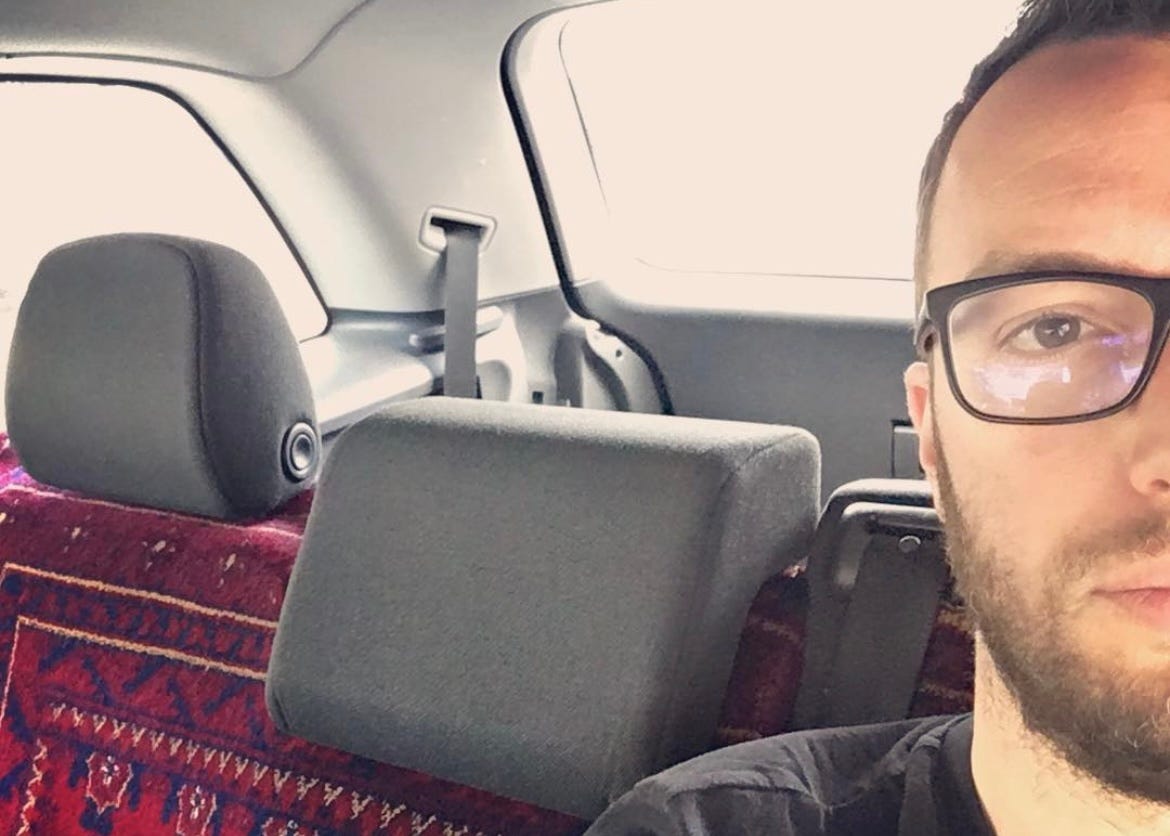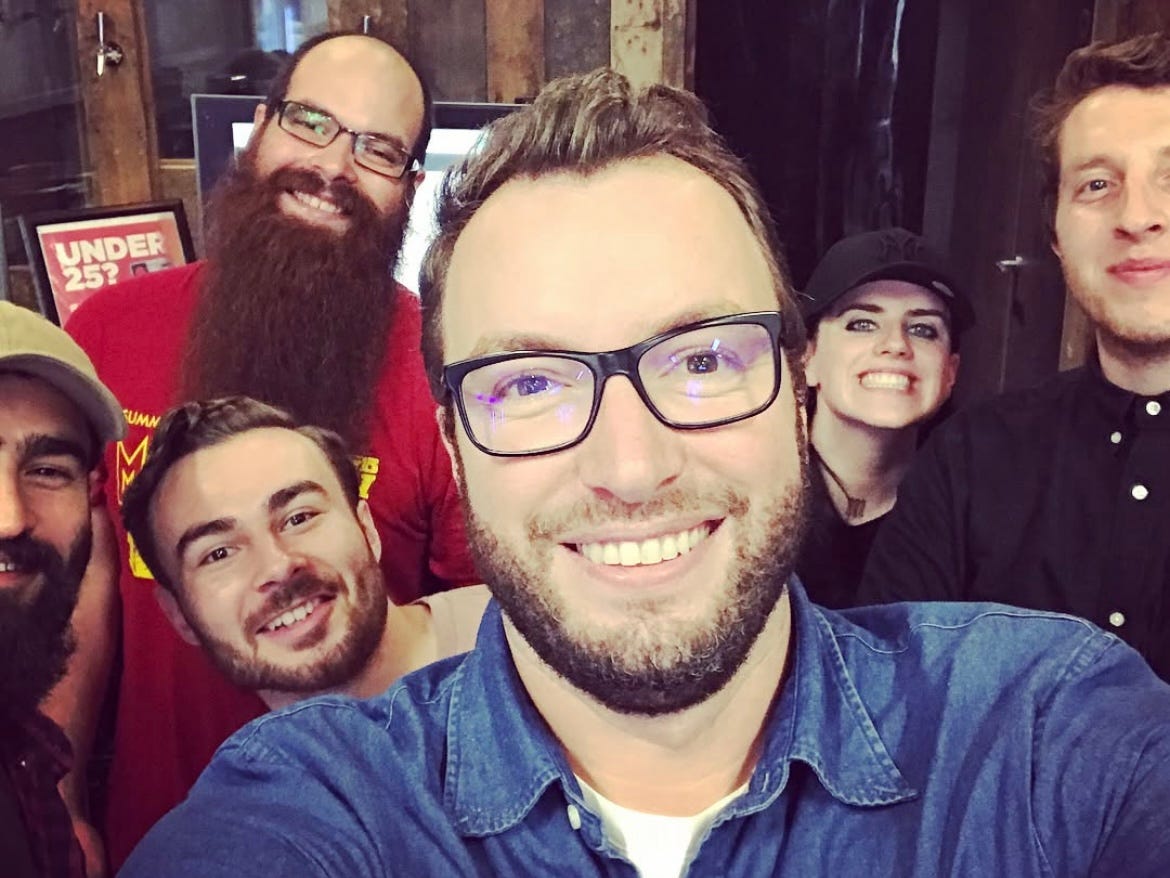Wroom wroom Visar
A comics fan, graphic designer and an entrepreneur who did projects for Nintendo and Sega, but first and foremost a Prishtina boy who became a London ad man. Meet Visar Statovci.
Visar Statovci’s life is fast and furious, with vast experience and versatile interests. He was a youth activist at the age of 14, joining a group of young activists called Postpessimists in the years before the war. He edited a comics strip magazine called Hapi Alternativ, but also had a side gig of helping his brother in the fledgling IT and graphic design industry during the years before Kosova’s liberation.
Visar moved to London in 1998 but used creativity to highlight the drama of those years, creating a series of artworks called Funky Strike with Genc Salihu during the NATO bombing. The frustration, sadness, and anxiety as 18-year-old kids with our country at war somehow manifested into creativity and dark humor, something he kept throughout his life (Of course he kept dark humor. He lives in England). He dabbled his fingers in film-making, producing a documentary titled Kosovatrans, moved on to work at an agency in London that did marketing for Apple and soon after started a web design firm only to find out that none of the four founders were coders and that "fake it until you make it" in this industry, in that country, doesn’t take you far.
Visar then founded company called Waste with his British pal Mike, while living in a converted church in Camden. The agency grew to 80 people with offices in London, Tokyo, and recently Manila, working with very cool companies such as Supercell, Nintendo, Sega, Riot, and EA, and cooperating with stars like Eric Andre.
Visar is now married, a father of two kids, still reads comics wherever he can, and keeps tabs on his native Kosova with the melancholy and contemplation of a Prishtina boy that became a London man. So here’s our TenTen interview with Visar!
1. What’s one element from Prishtina and one from London you’d blend into a video game to create the ultimate cultural mashup?
The lightning speed of life in London combined with Prishtina’s sense of humour and coffee culture. Hey, it could be like Seinfeld’s Comedians in Cars Getting Coffee—but in a game, and way crazier and faster!
2. If you had to design a game or comics or a movie super character based on yourself, what would their special abilities and quirks be?
Serious impatience. Gaming and marketing are both very fast-paced—if you're not moving fast, you’ll be left behind very quickly. That can make you quite impatient whenever things slow down.
3. What’s the wildest idea for creative business you’ve had that you almost pursued but didn’t?
I’ve been lucky enough to pursue most of my ideas—with varying degrees of success. One I haven’t done yet (it’s not wild, but I’d love to do it) is to create a comic book that brings some of our generation’s stories to life.
4. Living in London, do you find the city's fast-paced energy helpful for creativity, or do you miss Prishtina's more intimate vibe when brainstorming?
Both! Prishtina has a very unique and special vibe that I haven’t found anywhere else, and it’s very hard to put into words. It’s not surprising that it’s got such a cool and vibrant startup scene. London, on the other hand, is a cultural melting pot filled with diverse people, backgrounds, and ideas. At times, it can be overwhelming, but it’s also an amazing place for inspiration and creativity.
5. If you could team up with any artist, musician, or filmmaker (alive or not) to create a product in creative industries, who would it be and why?
As an artist, it would be Mike Mignola—he’s a creative genius. As for filmmakers, it would have to be the Coen Brothers. Bringing their storytelling into the world of gaming would be something truly special.
6. What are you currently reading or watching on TV which you find inspiring and intriguing?
I’m hooked on podcasts. Deconstructor of Fun for the latest in gaming (and for their IDGAF attitude, it’s very entertaining), and Diary of a CEO for business, psychology, and health. The latest book I read was Thinking, Fast and Slow—life-changing stuff. And I re-read Culture Code, which is super interesting if you’re building or running a creative team.
7. Does Prishtina ever sneak into your creative and business worlds? If so, what’s the Easter egg only Kosovars would notice?
I haven’t done much hands-on creative work recently, as running the business has gradually taken over, especially in recent years. But if I look back a while, I did a promo for a TV show and used some black-and-white family photos of my grandad, family members, and weddings. It aired back home, so you can imagine the surprise of my extended family seeing themselves on TV. It got some giggles, and no one shouted at me, so I guess it was a result.
8. You're a parent but your business is spending plenty of time in front of a screen. How do you limit screen time for your kids? Any tricks for other parents out there?
Kids these days socialise in Fortnite, Roblox, and Minecraft. We’ve got the same ideas here with my wife—we try doing activities with them that don’t involve screens or video games (building big, complex Lego sets is one of my favourites), and we talk to them about the importance of prioritisation. We do have one condition, or maybe we should call it what it is—a bribe: homework and reading before any screen time.
9. You used to be a youth activist and a graphic designer. What do you miss most from that part of your background?
Giving back. I’m a strong believer that we have to work on ourselves and become a success if we want to help others. I hope to find a way to do much more of that again in the future.
10. If you would design a creative campaign for Kosovo, what would it feature as a centerpiece?
The young entrepreneurs, the creatives, the people hustling daily to succeed and create opportunities for others. We have spirit in Kosovo and very ambitious young people—we should celebrate them and put them front and centre. They’re easily the best thing about Kosovo and its future.







